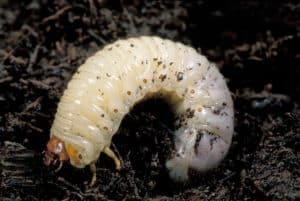What Happened to My Lawn?!
So you have worked all summer to groom and maintain a lush green lawn, and then fall comes and suddenly you find one morning that there are a large number of small holes dug in your grass. You have most likely been visited by a skunk. Skunks will search lawns to find grubs, especially in the fall when grubs are actively feeding and skunks are preparing for winter. The areas dug out by a skunk are shallow and may lift sections of the lawn to get to what lies underneath.
How do skunks find grubs
Skunks have a very good sense of smell and will dig down under the grass to where the grubs are feeding on the roots of the grass. Skunks are very efficient diggers and can produce a lot of these small holes in a short period of time. While skunks are searching mainly for grubs, they will eat almost any insect, worm or larvae that they uncover, including beneficial ones such as earthworms.
What are grubs

Grubs are the larvae of beetles such as Japanese beetles and June bugs. If you see reddish brown June bugs clumsily flying around in early summer or you see the iridescent and brown Japanese beetle eating the leaves of your bushes and leaving what looks like the skeleton of the leaf, you will know that there will be grubs in the lawn as well. You can also dig underneath the grass from a few inches down to about 8 inches to see if you can find the grubs in your lawn. Many people will see grubs when digging in flowerbeds around the yard in springtime.
How do I kill the grubs
So a positive step in reducing or eliminating the likelihood of skunks foraging in your lawn is to get rid of the grubs. There are different approaches that can be used to remove grubs from your yard, but you will want to consider the side effects or risks. Options for getting rid of grubs and beetles include:
- Chemical Pesticides
- Pheromone Traps
- Natural Treatments – Nematodes, Milky Spore
Chemical Pesticides typical work to kill a large variety of insects. The active ingredient in some pesticides will target an important enzyme that interferes with the biological functions of an insect, and others may attack the nervous system of an insect. They both will eventually lead to death. Because chemical pesticides can be used on many insects, you will want to carefully review warning labels and instructions about how to use these. Also some pesticides present a risk to children and animals.
Pheromone traps are very specific for the capture of specific beetles, such as Japanese beetles. A bait that has the pheromone of the beetle is positioned over a bag that draws beetles to it. Beetles fly towards the bait because it is an attractant for mating. Once they are on the trap, they fall into the bag and then cannot escape. This is a low risk method of getting rid of beetles before they lay eggs in the lawn that will hatch into grubs.
Beneficial nematodes are types of roundworms that prey on larvae in the ground. They will attack the grubs, killing it in a few days by acting as a parasite, then laying eggs in the dead grub. There are different forms of nematodes so just verify that the type (Hb for grubs) before buying. Along with nematodes, there is a type of bacteria called Milky Spore that gets inside the gut of a Japanese Beetle grub and will kill it in about 3 weeks. The bacteria reproduces in the dying grub and then can continue being effective in getting rid of more grubs. The nematodes and Milky Spore are a powerful 1-2 punch against grubs and has the advantage of being much more specific for killing grubs than chemical pesticides.
Remove the Skunk Buffet
After you review options for getting rid of the grubs it is time to act. If you have had a skunk already tear up your grass, it is safe to assume you have grubs in the lawn that need to be removed. Taking action early in the spring or immediately on finding the grubs will help make short work of the grubs, and send the unwanted skunk visitors searching somewhere else for dinner. A side benefit for getting rid of the grubs is that your lawn will likely be healthier since the roots will be able to grow and feed the grass rather than being munched on by grubs.
Another point to consider regarding the method you use to eliminate the grubs is what is located next to your yard. If you use a chemical pesticide, you can apply it to your yard, but if your neighbor’s lawn and your lawn are connected, you will need to be diligent in applying the pesticide regularly. Grubs living in your neighbors lawn will migrate back to your yard over time. And a skunk that finds grubs next door may still have a look through your grass to see if there are any grubs left.
The use of nematodes and milky spore can spread out from your yard and attack grubs in the areas connected to your lawn, so this could be more effective in the long run to eliminating the skunk visits. Also because these are biological they will reproduce and will not need to be reapplied as often as a chemical pesticide.

